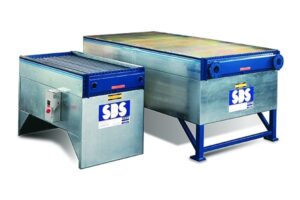The Green Advantage: Why Air-Cooled Heat Exchangers Trump Water Cooling for Quench Oil
February 13, 2020 by Peter Delone

In various industrial processes, the rapid cooling of quench oil plays a pivotal role in achieving desired material properties and product quality. Traditionally, water-cooled heat exchangers have been the go-to choice for quenching systems. However, as sustainability becomes a driving force in modern industry, it’s time to explore a more eco-friendly alternative: air-cooled heat exchangers. In this blog post, we’ll discuss the numerous benefits of using air-cooled heat exchangers for cooling quench oil, highlighting their advantages over water-cooled counterparts.
1. Water Conservation: One of the most compelling reasons to opt for an air-cooled heat exchanger is water conservation. In water-scarce regions or industries facing strict water usage regulations, the excessive water consumption of water-cooled heat exchangers can pose a significant challenge. Air-cooled systems require no water, making them a sustainable choice that helps conserve this precious resource.
2. Reduced Operating Costs: Water-cooled heat exchangers necessitate pumps, piping, and cooling towers, which consume electricity and require maintenance. In contrast, air-cooled heat exchangers have lower operating costs because they don’t rely on water circulation systems. This translates into significant energy savings and reduced maintenance expenses over time.
3. No Water Treatment Costs: Water used in cooling systems often requires treatment to prevent scale buildup, corrosion, and biological growth. Treating water can be expensive and time-consuming. Air-cooled heat exchangers eliminate the need for water treatment, further reducing operational costs.
4. Environmental Impact: Reducing water usage not only conserves this valuable resource but also lessens the environmental impact of industrial processes. Air-cooled heat exchangers help companies minimize their carbon footprint, making them a more environmentally responsible choice.
5. Enhanced Safety: Water-cooled systems can pose safety hazards due to the risk of leaks or electrical issues associated with water and electricity. Air-cooled heat exchangers eliminate these risks, creating a safer working environment for operators and reducing the potential for accidents.
6. Versatility and Space Savings: Air-cooled heat exchangers are compact and can be installed in tight spaces, offering greater flexibility in the layout of quenching systems. This can be particularly advantageous for retrofitting existing facilities or optimizing floor space.
7. Consistent Performance: Air-cooled heat exchangers provide consistent cooling performance, regardless of variations in water temperature or quality. This ensures a reliable and repeatable quenching process, which is crucial for achieving consistent material properties in heat-treated products.
8. Low Maintenance: Air-cooled heat exchangers generally require less maintenance compared to their water-cooled counterparts. There are no concerns about water quality, corrosion, or scaling, resulting in fewer maintenance-related disruptions and lower associated costs.
Conclusion
The shift towards more sustainable and eco-friendly industrial practices is driving the adoption of air-cooled heat exchangers for quench oil cooling. With advantages including water conservation, reduced operating costs, enhanced safety, and a smaller environmental footprint, air-cooled heat exchangers are a smart choice for companies looking to improve their quenching processes while aligning with modern sustainability goals. By making the switch from water-cooled systems to air-cooled ones, industries can simultaneously enhance their efficiency and contribute to a greener future.
